

Cathy Ellorin has to fight for each and every hour of her job. In fact, she has to fight to convince the people who pay her that what she does is a job at all. It’s not as though she works short hours; actually, she gets no time off at all. Her job isn’t easy, either.
Cathy is currently employed as an in-home caretaker to her daughter Natalia, who has cerebral palsy. California State’s In-Home Supportive Services program (IHSS) provides Cathy with financial support to enable her to stay at home with Natalia and keep her safe and happy. But Cathy has to fight to keep this support coming.
From the first years of Natalia’s life, Cathy could tell something wasn’t right. Natalia’s tremors were disconcerting enough, but the daughter’s inability to feed properly was far worse.
Cathy took Natalia to Children’s Hospital in Los Angeles for a wide range of neurological testing,
» Read more about: The Job of a Lifetime: Caregiving for a Disabled Daughter »


Job growth is sputtering. So why, exactly, do regressive Republicans continue to say “no” to every idea for boosting it — even last [month’s] almost absurdly modest proposal by President Obama to combine corporate tax cuts with increased spending on roads and other public works?
It can’t be because Republicans don’t know what’s happening. The data are indisputable. July’s job growth of 162,000 jobs was the weakest in four months. The average workweek was the shortest in six months. The Bureau of Labor Statistics has also lowered its estimates of hiring during May and June.
It can’t be Republicans really believe further spending cuts will help. They’ve seen the effects of austerity economics on Europe. They know the study they relied on by Carmen Reinhart and Kenneth Rogoff has been debunked. They’re no longer even trying to make the case for austerity.
» Read more about: Republicans’ Economic Stance: Pray for Pain »
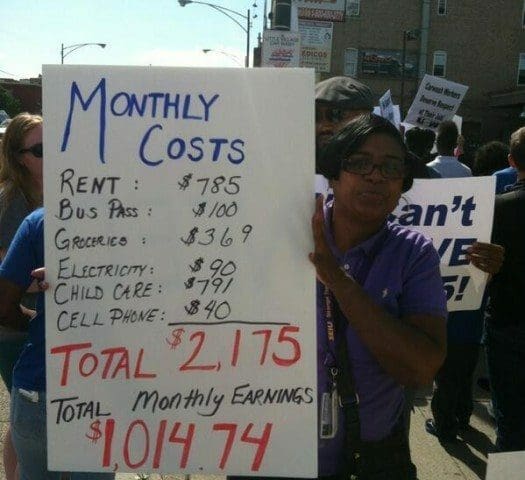
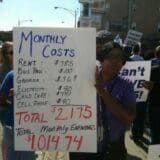
Something is happening among our low-wage workers in America.
Is the ghost of the Occupy movement stirring?
Probably, but maybe more. In just one astonishing week recently, the Seattle Times—a newspaper not known for being pro-labor—featured worker protests either as the lead story or prominently in the paper:
» Read more about: Behind the Stirring Among Low-Wage Workers »


Dear Brother,
In my job I use
a tiny torch
it opens and closes as I stitch
metal with a syringe of light
bright as a drop of sun. I try
not to look but two white spots
burn at the back of my eyes.
In one I see
the other jobs I’ve had –
cleaning up inn rooms
— someone else’s stain.
In the other: years
nearly starving on the farm
never enough, no wheels, no
way to town.
Between
these two spots the men
who wanted something and me
just trying to make it work.
Possession
implies something remains,
but want is all it is.
Dear Brother,
in little squeezes of light
that whisper and cut
are months and years my history
turned white
in this brazier that captures and holds,
this chamber
where everything
hardens and glows.
——————————————————–——————————————————–
Source: The Dos Passos Review,
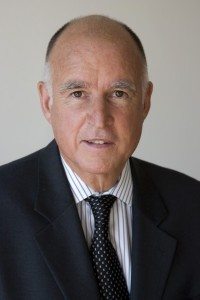

In 2008, Governor Arnold Schwarzenegger signed SB 375, the first piece of legislation in any state that tied transportation choices to greenhouse gas emissions and global warming. The legislation, authored by Senator Darrell Steinberg, required that planning regions create transportation plans that would reduce Greenhouse Gas emissions to 1990 levels by 2020.
As more and more regions adopt these plans, an obvious flaw is emerging. Plans are only as good as the money that exists to implement them. With funding scarce, many of these plans will likely gather dust.
Steinberg went back to work. His first piece of legislation to address this shortfall was vetoed by Governor Brown last year. Brown felt that the timing wasn’t right for legislation that gave municipalities the power to create agencies similar to the Community Redevelopment Agencies he had just ordered dismantled. That didn’t stop Steinberg from reintroducing similar legislation,
» Read more about: Will Jerry Brown OK Sustainable Development? »


How did the BART dispute ever reach this point?
For several weeks now, BART [Bay Area Rapid Transit] management has mounted a sophisticated PR campaign, stating that its workers are overpaid and unreasonable. But its evidence on employee pay and benefits has been misleading at best; its estimates of average pay include many highly paid managers, thus exaggerating significantly the pay of frontline employees. Likewise, management’s statements on employee contributions to health benefits have failed to account for the significant out-of-pocket expenses incurred by many BART employees.
Denigrating your workers in the media may be a winning strategy in the battle for public opinion, but it’s a foolhardy one for senior management running an organization whose success depends so heavily on employee commitment and flexibility.
This week’s public hearing in Oakland before Governor Brown’s three-member investigative panel provided an entirely different version of events from BART’s media campaign.
» Read more about: Truth Gets Derailed in BART’s Media Campaign »


(Dave Zirin writes about sports and society for the Nation, where this post first appeared. Republished with permission.)
Sometimes it’s all just too damn much. First came word this week that the famed Coney Island statue of Jackie Robinson, standing alongside Pee Wee Reese as sporting symbols of racial progress, had been defaced, with “die n***ers,” “f*ck Jackie Robinson and all n***ers,” and “Heil Hitler” scrawled across it. It’s quite the capstone to a summer that started with the sweetly hopeful biopic, 42, about Robinson’s early career and post-racial promise. There is no doubt if Robinson still walked among us, he wouldn’t be shocked at the vandalism of his statue. He’d grit his teeth and set to cleaning it with his bare hands as a vein throbbed dangerously on his temple. This is the world—and the country—Jackie Robinson knew all too well.
» Read more about: Jackie Robinson, Trayvon Martin and the Ebony Boycott »
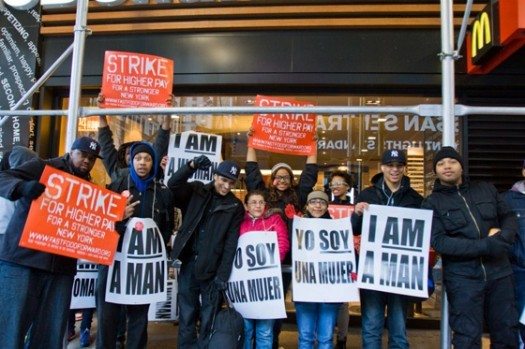

 Recent one-day strikes at McDonald’s and other fast food restaurants around the country grab the public’s attention and generate much more buzz than standard union/management contract disputes.
Recent one-day strikes at McDonald’s and other fast food restaurants around the country grab the public’s attention and generate much more buzz than standard union/management contract disputes.
Showcasing the personal struggle and courage of low-wage workers and the greedy companies which refuse to raise their pay, these “Fast Food Forward” protests sidestep traditional collective bargaining practices. But much of the funding and organizing talent comes directly from established national unions such as SEIU [Service Employees International Union].
Alt-labor campaigns portray a labor movement dedicated to building power among part-time, entry-level service workers and communicate a central message of organizing: That the only way to bring employers around is to stir up trouble.
Could Alt-Labor’s positive spin rub off on some of the labor movement’s other challenges, where public sympathy is in shorter supply? For example: unionized government workers facing upcoming pension battles in many cities and states.


Why Labor Organizing Should be a Civil Right: Rebuilding a Middle-Class Democracy by Enhancing Worker Voice, by Moshe Z. Marvit and Richard D. Kahlenberg, was released last year to critical and academic acclaim but not nearly enough attention. The book, whose authors are both fellows at the progressive think tank the Century Foundation, lays out a simple, brilliant idea: to amend the Civil Rights Act so that it prohibits discriminating against workers for attempting to organize a union.
We recently had a chance to pick the authors’ brains about the inspiration for the book, how the legislation would work and why this is an idea whose time has come.
Feldner-Shaw: For those who haven’t heard about it, can you briefly describe the premise or thesis of the book?
Marvit and Kahlenberg: As the title suggests, the book Why Labor Organizing Should be a Civil Right makes the argument that labor activities are a civil right and should be treated as such by our laws.
» Read more about: Should Labor Organizing Be a Civil Right? »
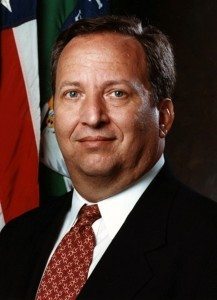
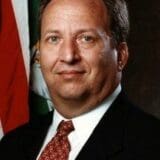
 In his recent defense of Larry Summers President Obama appeared to be badly confused about the state of the economy. This apparently leads him to believe that the country should be grateful to Larry Summers for his successes, as opposed to furious at him for his failures.
In his recent defense of Larry Summers President Obama appeared to be badly confused about the state of the economy. This apparently leads him to believe that the country should be grateful to Larry Summers for his successes, as opposed to furious at him for his failures.
Obama’s story is that the economy was in a free fall when he took office and the program that was in large part designed by Summers helped turn it around. While it is true that the economy was in free fall, there was no reason to expect that to continue regardless of what policies were pursued. Note that in every single wealthy country the sharp drop in output at the end of 2008 and the beginning of 2009 was stopped and reversed by the end of the year. Other countries were not able to rely on the genius of Larry Summers in setting their policies.


Not only does Walmart set the wholesale market price for many of the products and food commodities sold in its stores, it also apparently commands the unswerving political loyalty of some of the nonprofit groups that the retail giant underwrites. The Nation’s Lee Fang writes about how a trio of interns ran afoul of OCA Asian Pacific American Advocates (formerly known as the Organization of Chinese Americans), a prominent Asian American civil rights group, for displaying disrespect to Walmart — a large OCA funder. The story played out in Las Vegas last month during OCA’s annual convention, when one intern was rebuked by OCA staff for criticizing Walmart’s drive to open a grocery market in Los Angeles’ historic Chinatown. She and two colleagues were later booted out of the convention when a private video they’d made of flipping off Walmart made its way onto a public Facebook page.
» Read more about: Walmart Casts a Shadow on Civil Rights Group’s Convention »
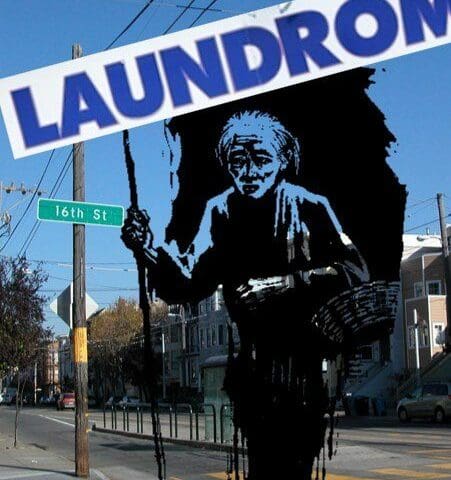
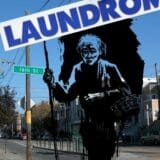
(The New York Times’ Thomas Friedman fancies himself a prophet who can foresee the future. Just look at his recent column on the “Sharing Economy” to see what the future has in store for us. Not good enough? I’ve studied Friedman’s ways and also learned to see the future. In fact, I’ve gotten so good at it that I’ve already written his next column.)
The Washed-Out Economy
Bill Richman and Teddy Wealthman were San Francisco roommates with a problem.
“We worked all the time at our well-paying Silicon Valley jobs,” Bill recently told me, “and didn’t have time to do our laundry.”
 So Bill and Teddy got an idea. While walking down 16th Street in San Francisco’s Mission District, on their way to get a $6-dollar cup of single-origin,
So Bill and Teddy got an idea. While walking down 16th Street in San Francisco’s Mission District, on their way to get a $6-dollar cup of single-origin,
» Read more about: Through Thomas Friedman’s Looking Glass »


 On [July 30], President Obama gave a great speech on why good jobs are the foundation for his middle-out economic strategy… from a huge Amazon warehouse where the workers do not have good jobs. I’m still stuck on the setting.
On [July 30], President Obama gave a great speech on why good jobs are the foundation for his middle-out economic strategy… from a huge Amazon warehouse where the workers do not have good jobs. I’m still stuck on the setting.
There is so much in President Obama’s speech that I’ve been wanting him to say. While the press focused on his announcement of a proposal on corporate taxes, the speech was almost entirely about jobs. After Obama described “what it means to be middle-class in America” as “A good job. A good education. A home to call your own. Affordable health care… A secure retirement,” he pointed out, “It’s hard to get the other stuff if you don’t have a good job.”
He told the Amazon warehouse workers, “we should be doing everything we can as a country to create more good jobs that pay good wages.”
But as The New York Times reported,


In the Appalachian foothills of Georgia, about an hour north of Atlanta, the riverfront city of Rome serves as a regional hub for health care. Near Rome’s tree-lined historic downtown, there are two well-equipped acute care hospitals with a total of more than 530 beds. Two years ago, the Medical College of Georgia opened a satellite campus in the city.
But in Rome, 27 percent of adults under 65 are uninsured, a rate that holds true across the state. Last year, the city’s two hospitals report spending more than $80 million delivering uncompensated care, often in the emergency room, where costs run high. Taxpayers and those with health insurance will end up paying for that care through government subsidies and higher premiums, industry experts say.
Rome’s dilemma is exactly the situation that the Patient Protection and Affordable Care Act, also known as “Obamacare,” was designed to fix — but that fix isn’t coming to Georgia.
» Read more about: Dixie Governors Say No to Expanding Medicaid »


 It’s August, and Americans by the millions are cramming themselves into coach-class seats as they embark on their summer vacations. Those able to learn from adversity might ponder this: Airline seating may be the best concrete expression of what’s happened to the economy in recent decades.
It’s August, and Americans by the millions are cramming themselves into coach-class seats as they embark on their summer vacations. Those able to learn from adversity might ponder this: Airline seating may be the best concrete expression of what’s happened to the economy in recent decades.
Airlines are sparing no expense these days to enlarge, upgrade and increase the price of their first-class and business-class seating. As the space and dollars devoted to the front of the planes increase, something else has to be diminished, and, as multitudes of travelers can attest, it’s the experience of flying coach. The joys of air travel — once common to all who flew — have been redistributed upward and are now reserved for the well-heeled few.
The new business-class seats that Lufthansa is installing convert to quasi-beds that are six-feet six-inches long and two feet wide, the New York Times’ Jad Mouawad reports.
» Read more about: Economic Inequality: The Sky’s Not the Limit »
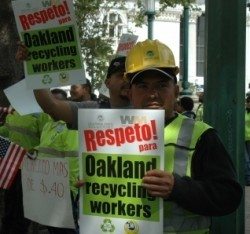
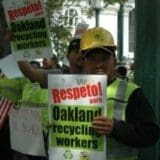
 Over 200 Oakland recycling workers staged a powerful show of unity and action by striking on Tuesday, July 30. Employees from the city’s two recycling contractors – Waste Management and California Waste Solutions (CWS) – walked off their jobs midway through the morning shift.
Over 200 Oakland recycling workers staged a powerful show of unity and action by striking on Tuesday, July 30. Employees from the city’s two recycling contractors – Waste Management and California Waste Solutions (CWS) – walked off their jobs midway through the morning shift.
Then, instead of picketing in remote industrial areas where the recycling plants are located, workers formed caravans that converged downtown at Oakland’s City Hall. The result was a full day of political action and solidarity that included marches, “human billboards” along Broadway and 14th Street, visits with local and state elected officials, and a spirited rally. The day ended where rally participants – including many community allies – filled the upper seats of the City Council chambers and addressed the City Council that evening.
Recycling worker Emanuel San Gabriel is one of CWS workers who left his dusty and noisy workplace behind to join the protest.
» Read more about: Waste Happens — So Do Accidents and Death »
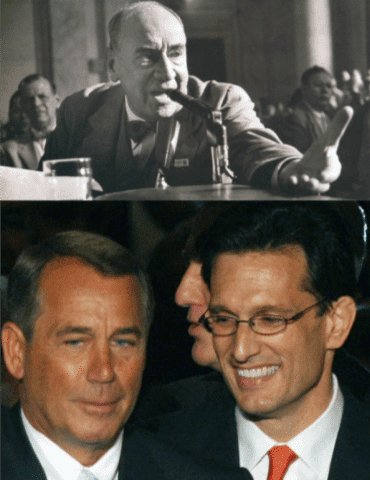

One of the most famous lines not spoken by the man it’s been attributed to is “Have You No Shame?” During the infamous Communist-witch-hunt Hearings of Wisconsin Republican Senator Joseph McCarthy in 1954, attorney Joseph Welch supposedly fired these words at McCarthy. What he actually said, however, is “Have You No Sense of Decency?”
Nevertheless, the first wording, mythical as it is, seems the more appropriate one to ask present-day Republicans, especially in the House of Representatives.
The majority of Americans are not always correct. But their consistently low regard for the present Congress, especially the Republican behavior within it, is dead-on. In a late July 2013 NBC/WSJ poll, only 12 percent approved of the job Congress was doing, while 83 percent disapproved. Another question (and the percentage response indicated afterward) was “Do you think Republicans in Congress are too inflexible in dealing with President Obama (56 percent),


An interview with John Densmore is less a linear dialogue and more a jazz improvisation, with unexpected twists and turns and no clear beginning or end. Which is not to say that the Doors’ drummer is without a steady beat — this is a man determined to drive home his message about the corrosive effects of greed. Densmore’s convictions led him to sue his former bandmates, Ray Manzarek and Robby Krieger, for trying to tour under the name “The Doors of the 21st Century” and using the band’s logo.
Densmore prevailed, but not without a bruising battle that created a bitter divide between the artists who once teamed with Jim Morrison on one of the greatest rock and roll bands in history. The story of that clash is the subject of Densmore’s latest book, The Doors Unhinged: Jim Morrison’s Legacy Goes to Trial.
Frying Pan News caught up with Densmore recently and riffed with him about what he calls “The Greed Gene,” Morrison’s views on money and his reconciliation with Manzarek before the keyboardist’s death earlier this year.
» Read more about: The Doors’ John Densmore Beats the Drum Against Greed »


The Affordable Care Act, or Obamacare as it’s referred to, is going to dramatically change the way we live our lives and balance our budgets. The largest group of beneficiaries is working people who are currently not covered by their employer yet don’t earn enough to buy health insurance on their own, including a large number of food service and retail workers. These workers currently are forced to pay out of pocket, forgo medical treatment or rely on public health clinics.
You’d imagine these workers would be jumping for joy at the thought of a new federal law requiring their employers to help them meet a critical human need. Unfortunately, there is little recourse for these workers for the next two years. While most of the healthcare dialogue has revolved around the individual requirement, the recent announcement that the employer mandate will be pushed back until 2015 has quietly fallen off the radar.
A specter is haunting Detroit — the specter of the Koch Brothers’ toxic brand of unregulated corporatism, as embodied in a cloud bank of pollution that recently blackened the Motor City’s horizon. Abby Zimet, writing in Common Dreams, describes the event as captured by a
[m]ind-boggling video of a billowing, high-carbon, high-sulfur cloud from the mountain of petroleum coke – waste from Canadian tar sands shipped from Alberta to Detroit, and the dirtiest potential energy source ever – illegally stored by the Koch Brothers along the Detroit River. Produced by Marathon Refinery but owned by Koch Carbon, the pet-coke piles have for months been producing “fugitive dust” – i.e.: thick black crud – that blankets the homes of outraged residents and lawmakers; analysis shows the dust contains elevated levels of lead, sulfur, zinc and the likely carcinogenic vanadium.
As we noted here last year,
» Read more about: Koch Brothers’ Huge Coke Cloud Darkens Detroit »